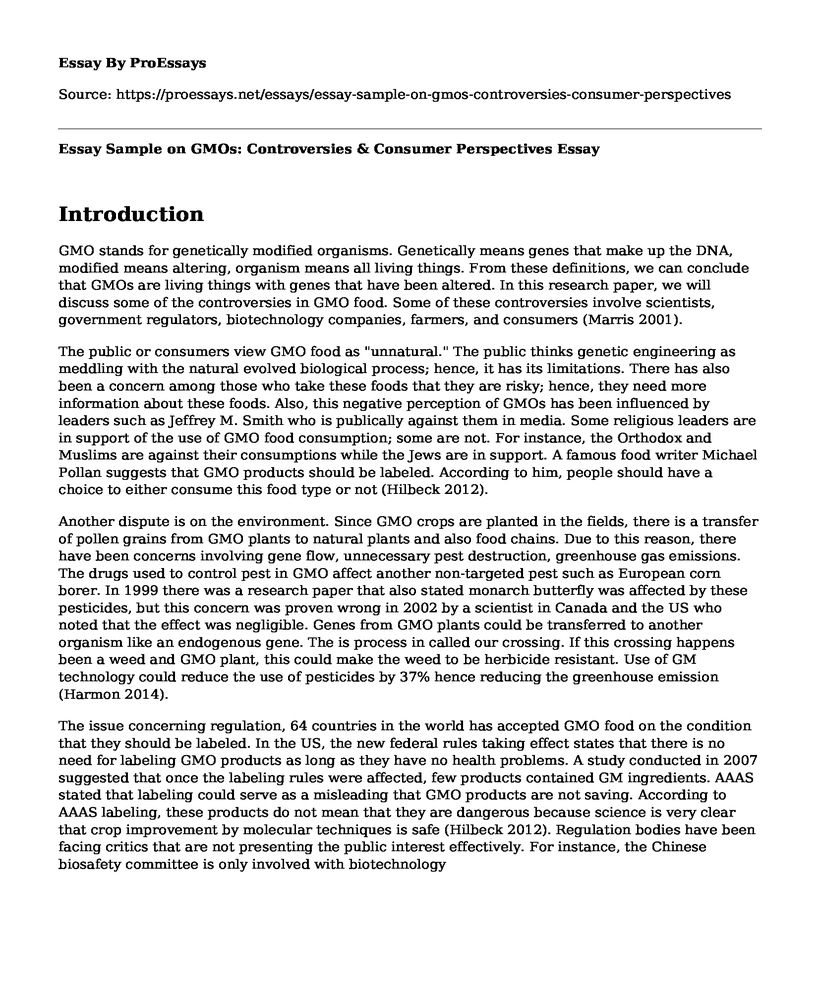Introduction
GMO stands for genetically modified organisms. Genetically means genes that make up the DNA, modified means altering, organism means all living things. From these definitions, we can conclude that GMOs are living things with genes that have been altered. In this research paper, we will discuss some of the controversies in GMO food. Some of these controversies involve scientists, government regulators, biotechnology companies, farmers, and consumers (Marris 2001).
The public or consumers view GMO food as "unnatural." The public thinks genetic engineering as meddling with the natural evolved biological process; hence, it has its limitations. There has also been a concern among those who take these foods that they are risky; hence, they need more information about these foods. Also, this negative perception of GMOs has been influenced by leaders such as Jeffrey M. Smith who is publically against them in media. Some religious leaders are in support of the use of GMO food consumption; some are not. For instance, the Orthodox and Muslims are against their consumptions while the Jews are in support. A famous food writer Michael Pollan suggests that GMO products should be labeled. According to him, people should have a choice to either consume this food type or not (Hilbeck 2012).
Another dispute is on the environment. Since GMO crops are planted in the fields, there is a transfer of pollen grains from GMO plants to natural plants and also food chains. Due to this reason, there have been concerns involving gene flow, unnecessary pest destruction, greenhouse gas emissions. The drugs used to control pest in GMO affect another non-targeted pest such as European corn borer. In 1999 there was a research paper that also stated monarch butterfly was affected by these pesticides, but this concern was proven wrong in 2002 by a scientist in Canada and the US who noted that the effect was negligible. Genes from GMO plants could be transferred to another organism like an endogenous gene. The is process in called our crossing. If this crossing happens been a weed and GMO plant, this could make the weed to be herbicide resistant. Use of GM technology could reduce the use of pesticides by 37% hence reducing the greenhouse emission (Harmon 2014).
The issue concerning regulation, 64 countries in the world has accepted GMO food on the condition that they should be labeled. In the US, the new federal rules taking effect states that there is no need for labeling GMO products as long as they have no health problems. A study conducted in 2007 suggested that once the labeling rules were affected, few products contained GM ingredients. AAAS stated that labeling could serve as a misleading that GMO products are not saving. According to AAAS labeling, these products do not mean that they are dangerous because science is very clear that crop improvement by molecular techniques is safe (Hilbeck 2012). Regulation bodies have been facing critics that are not presenting the public interest effectively. For instance, the Chinese biosafety committee is only involved with biotechnology
Conclusion
Finally, there is a dispute on the health condition of the GMOs. According to the scientific consensus that currently exists, GM product poses no risks to human health. The members of the public have less likelihood to accept genetic products as safe for consumptions. In response to this concern, the European Commission, for instance, funded scientist group to test the GM products in response to the public interest. They concluded the same results that the products are safe (Harmon 2014).
Work Cited
Harmon, Amy. "A lonely quest for facts on genetically modified crops." New York Times, (2014).
Hilbeck, Angelika, Matthias Meier, and Miluse Trtikova. "Underlying reasons for the controversy over adverse effects of Bt toxins on lady beetle and lacewing larvae." Environmental Sciences Europe 24.1 (2012): 9.
Marris, Claire. "Public views on GMOs: deconstructing the myths: Stakeholders in the GMO debate often describe public opinion as irrational. But do they understand the public?." EMBO reports 2.7 (2001): 545-548.
Cite this page
Essay Sample on GMOs: Controversies & Consumer Perspectives. (2023, Jan 16). Retrieved from https://proessays.net/essays/essay-sample-on-gmos-controversies-consumer-perspectives
If you are the original author of this essay and no longer wish to have it published on the ProEssays website, please click below to request its removal:
- Can Apes Learn Language?
- Essay Sample on Dairy Farming Facilities and Staffing
- Research Paper on Extinction & Endangered Species: A Human-Catalyzed Catastrophe
- Research Paper on Uniting to Thwart the Worldwide Extinction Crisis
- Exploring the Rich Biodiversity of Amazon Rainforest - Essay Sample
- Harvest Rainwater Easily: Simple & Fancy Rain Barrels for Runoff Control - Essay Sample
- Melting Point: Key to Substance Purity & Identification - Paper Sample







